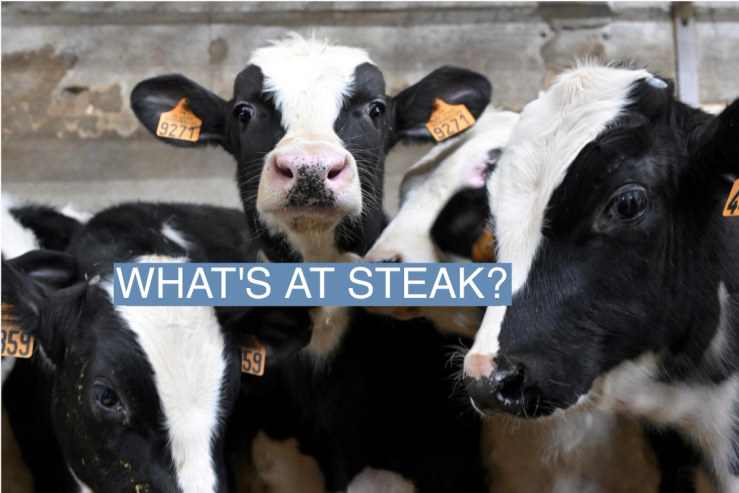The News
An Israeli company has received a preliminary go-ahead to sell the world’s first lab-grown steaks. The meat will be grown from fertilized egg cells from a Black Angus cow named Lucy and priced similarly to premium conventional beef.
The Israeli Health Ministry granted Aleph Farms preliminary approval to sell the product in December, the company announced last week. Israeli Prime Minister Benjamin Netanyahu called the development “a global breakthrough.”
Aleph Farms joins a growing list of companies looking to grow meat in addition to or instead of butchering animals. This summer, two California-based farms got the greenlight to sell lab-grown chicken in the U.S. and Singapore.
But diners won’t see this beefy innovation on their plates in the immediate future, the company said. The product is still making its way through the regulatory process, which could take months.
SIGNALS
Lab-grown meat could be greener than traditional, but the jury is out
“The presumption—and I say ‘presumption’ carefully—is that, yes, you’ll have a more sustainable food production system,” David Kaplan, a bioengineer at Tufts University, told Scientific American. Cultured meat production facilities are expected to consume less land and water than traditional meat farms, but “their total eventual carbon footprint at a mass-production scale is unclear,” the outlet reported.
A study from the University of California, Davis, which has not yet been peer reviewed, found that lab-grown meat production might actually have a higher environmental impact than traditional methods. That’s because the method currently used to grow the meat uses significant resources, “which then increases global warming potential.”
Some livestock farmers see lab-grown meat as a threat
Lab-grown meat could eventually pose competition to traditional meat production, some livestock farmers have warned. A main concern is how the new product will be labeled, and farmers in several U.S. states are pushing for legislation to bar lab-grown meat companies from calling their product meat. “If they label it as a ribeye or a beef steak or you know, chicken nuggets, that’s just not true,” one farmer told a Colorado news station. “It needs to be labeled as a cell-cultured or a cell-based product and I think the public needs to know that.” One Republican lawmaker in Florida wants to criminalize lab-grown meat, calling it an “affront to nature and creation” and a part of the “ESG agenda.”
A UK study into farmers’ attitudes towards cultured meat found that while many were concerned about the meat industry’s future, some believed that the proliferation of lab-grown meat could make the “real stuff” more valuable to certain consumers.
Lab-grown meat has a public relations problem
“Cultured meat may evoke hesitation for seeming so unnatural and unfamiliar – and potentially so disgusting,” a 2022 study in the Journal of Environmental Psychology noted, finding that 35% of meat-eaters said they were too disgusted by the concept to try the product. That could pose an issue as companies like Aleph Farms try to market their products to the public.
Fifty percent of Americans say they are not very or not at all interested in eating cell-cultivated meat, according to a 2023 survey by the AP-NORC Center for Public Affairs Research. Those who don’t want to try it mostly cited “it just sounds weird” as their reasoning, though many also expressed concerns about safety.




